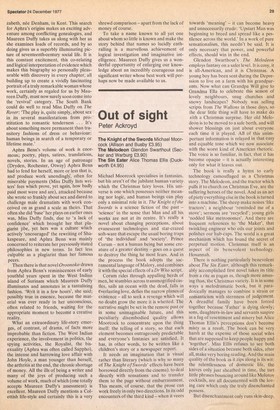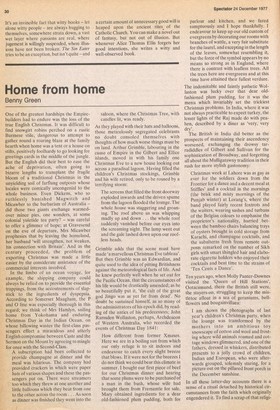Out of sight
Peter Ackroyd
The Knight of the Swords Michael Moorcock (Allison and Busby £3.95) The Melodeon Glendon Swarthout (Seeker and Warburg £3.90) The Sin Eater Alice Thomas Ellis (Duckworth £4.95) Michael Moorcock specialises in fantasies, but his aren't of the jubilant human variety which the Christmas fairy loves. His universe is one which possesses neither meaning nor logic, and human beings can play only a minimal role in it. The Knight of the Swords is a science fiction of the past — 'science' in the sense that Man and all his works are not at its centre. It's really a novel about changing perceptions, about evanescent technologies and star-crazed soft-ware that escape the usual boring traps of 'the individual' and 'society'. Prince Corum — not a human being but some creature of a greater destiny — goes on a quest to destroy the thing he most fears. And in the process the book adopts the sacramental language of Malory, and combines it with the special effects of a Dr Who script.
Corum rides through appalling herds of men, he stumbles across transmogrified castles, sails an ocean with the dead, falls in everlasting love, defies the narrow planes of existence — all to seek a revenge which will no doubt grow the more it is whetted. The narrative might be set in the remote past or in some unimaginable future, and this peculiarly disembodied quality allows Moorcock to concentrate upon the thing itself: the telling of a story, so that each element becomes outrageously predictable and everyone's fantasies are satisfied. It has, in other words, to be written like a children's story or a newspaper report.
It needs an imagination that is visual rather than literary (which is why so many of The Knight of Swords' effects have been borrowed directly from the cinema), to deal directly with sensations and to transfer them to the page without embarrassment. This means, of course, that the prose can work freely in only two directions. In its odd encounters of the third kind — when it veers towards 'meaning' — it can become heavy and unnecessarily crude: 'Upstart Man was beginning to breed and spread like a pestilence across the world.' In a work of pure sensationalism, this needn't be said. It is only necessary that power, and powerful effects, should win in the end.
Glendon Swarthout's The Melodeon employs fantasy on a safer level. It is cosy, it is all-American, and it is Christmas. A young boy has been sent during the Depression to live on a farm with his grandparents. Now what can Grandpa Will give to Grandma Ella to celebrate this Season of lovely neighbours, snug churches and snowy landscapes? Nobody was selling scripts from The Waltorts in those days, so the dear little thing will have to make do with a Christmas surprise. Her old Melodeon is to be moved to a safe berth, and will shower blessings on just about everyone each time it is played. All of this unimportant information is relayed in that easy and equable tone which we now associate with the worst kind of American rhetoric. The voice is so familiar, in fact, that it has become opaque — it is actually interesting only for what it leaves out.
The book is really a hymn to early technology camouflaged as a Christmas story. The Melodeon, and the tractor which pulls it to church on Christmas Eve, are the suffering heroes of the novel. And as an act of piety everything else in the book is turned into a machine. The sheep make noises 'like tractors': a neighbour 'reminded me of a stove'; sermons are 'recycled'; young girls 'nodded like metronomes'. And there are frequent references to 'the Maker', that twinkling engineer who oils our joints and polishes our hub-caps. The world is a great mechanism which has found the secret of perpetual motion. Christmas itself is an aspect of its benevolent technology. Hosannah.
There is nothing particularly benevolent about The Sin Eater, although this remarkably accomplished first novel takes its title from a rite as pagan as, though more amusing than, the Christmas variety. It is in some ways a melodramatic book, but it paradoxically manages to combine a strain or romanticism with sternness of judgement. A dreadful family have been forced together because 'Father' is dying slowly; sons, daughters-in-law and servants suspire in a fug of resentment and misery but Alice Thomas Ellis's perceptions don't become misty as a result. The book can be very harsh at the expense of those social wiles that are supposed to keep people happy and 'together'. Miss Ellis refuses to see both sides of a situation because both stdes, after all, make very boring reading. And the main quality of the book as it zips along is its wit: the relentlessness of domestic life, the knives only just sheathed in time, the tart little phrases bouncing around like Molotov cocktails, are all documented with the loving care which only the truly disenchanted possess.
But disenchantment only runs skin-deep, It's an invincible fact that witty books — let alone witty people — are always hugging to themselves, somewhere strata down, a vast wet layer where passions are real, where jugement is willingly suspended, where illusions have not been broken. The Sin Eater tries to be an exception, but isn't quite —and a certain amount of unnecessary good will is heaped upon the ancient rites of the Catholic Church. You can make a novel out of fantasy, but not out of illusion. But whenever Alice Thomas Ellis forgets her good intentions, she writes a witty and well-observed book.











































 Previous page
Previous page